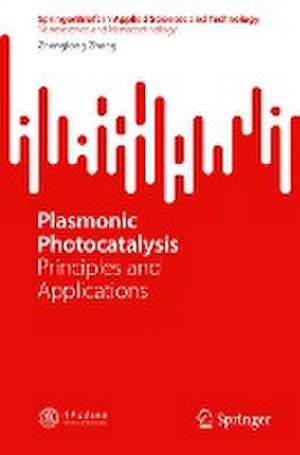Plasmonic Photocatalysis: Principles and Applications: SpringerBriefs in Applied Sciences and Technology
Autor Zhenglong Zhangen Limba Engleză Paperback – 30 oct 2022
Din seria SpringerBriefs in Applied Sciences and Technology
-
 Preț: 380.29 lei
Preț: 380.29 lei - 17%
 Preț: 360.34 lei
Preț: 360.34 lei - 20%
 Preț: 386.12 lei
Preț: 386.12 lei -
 Preț: 380.07 lei
Preț: 380.07 lei -
 Preț: 377.95 lei
Preț: 377.95 lei -
 Preț: 382.32 lei
Preț: 382.32 lei -
 Preț: 376.59 lei
Preț: 376.59 lei -
 Preț: 379.09 lei
Preț: 379.09 lei -
 Preț: 378.12 lei
Preț: 378.12 lei - 20%
 Preț: 293.83 lei
Preț: 293.83 lei -
 Preț: 344.90 lei
Preț: 344.90 lei -
 Preț: 321.36 lei
Preț: 321.36 lei -
 Preț: 264.79 lei
Preț: 264.79 lei -
 Preț: 356.46 lei
Preț: 356.46 lei -
 Preț: 382.95 lei
Preț: 382.95 lei -
 Preț: 355.66 lei
Preț: 355.66 lei -
 Preț: 479.67 lei
Preț: 479.67 lei -
 Preț: 415.18 lei
Preț: 415.18 lei -
 Preț: 444.52 lei
Preț: 444.52 lei - 20%
 Preț: 301.86 lei
Preț: 301.86 lei -
 Preț: 409.43 lei
Preț: 409.43 lei - 20%
 Preț: 322.17 lei
Preț: 322.17 lei -
 Preț: 355.49 lei
Preț: 355.49 lei - 15%
 Preț: 462.51 lei
Preț: 462.51 lei -
 Preț: 377.18 lei
Preț: 377.18 lei -
 Preț: 355.93 lei
Preț: 355.93 lei -
 Preț: 382.95 lei
Preț: 382.95 lei -
 Preț: 378.12 lei
Preț: 378.12 lei -
 Preț: 378.12 lei
Preț: 378.12 lei -
 Preț: 380.07 lei
Preț: 380.07 lei -
 Preț: 380.07 lei
Preț: 380.07 lei - 20%
 Preț: 326.28 lei
Preț: 326.28 lei -
 Preț: 312.68 lei
Preț: 312.68 lei -
 Preț: 356.43 lei
Preț: 356.43 lei -
 Preț: 412.30 lei
Preț: 412.30 lei - 20%
 Preț: 225.31 lei
Preț: 225.31 lei -
 Preț: 378.12 lei
Preț: 378.12 lei -
 Preț: 376.59 lei
Preț: 376.59 lei -
 Preț: 195.87 lei
Preț: 195.87 lei -
 Preț: 376.22 lei
Preț: 376.22 lei - 20%
 Preț: 324.64 lei
Preț: 324.64 lei - 20%
 Preț: 288.73 lei
Preț: 288.73 lei -
 Preț: 377.57 lei
Preț: 377.57 lei -
 Preț: 261.91 lei
Preț: 261.91 lei -
 Preț: 381.98 lei
Preț: 381.98 lei -
 Preț: 273.64 lei
Preț: 273.64 lei -
 Preț: 410.87 lei
Preț: 410.87 lei -
 Preț: 379.68 lei
Preț: 379.68 lei -
 Preț: 374.30 lei
Preț: 374.30 lei
Preț: 344.90 lei
Nou
Puncte Express: 517
Preț estimativ în valută:
65.99€ • 69.15$ • 54.56£
65.99€ • 69.15$ • 54.56£
Carte disponibilă
Livrare economică 22 martie-05 aprilie
Preluare comenzi: 021 569.72.76
Specificații
ISBN-13: 9789811951879
ISBN-10: 981195187X
Pagini: 91
Ilustrații: VIII, 91 p. 60 illus., 55 illus. in color.
Dimensiuni: 155 x 235 mm
Greutate: 0.18 kg
Ediția:1st ed. 2022
Editura: Springer Nature Singapore
Colecția Springer
Seriile SpringerBriefs in Applied Sciences and Technology, Nanoscience and Nanotechnology
Locul publicării:Singapore, Singapore
ISBN-10: 981195187X
Pagini: 91
Ilustrații: VIII, 91 p. 60 illus., 55 illus. in color.
Dimensiuni: 155 x 235 mm
Greutate: 0.18 kg
Ediția:1st ed. 2022
Editura: Springer Nature Singapore
Colecția Springer
Seriile SpringerBriefs in Applied Sciences and Technology, Nanoscience and Nanotechnology
Locul publicării:Singapore, Singapore
Cuprins
Chapter 1. Introduction.- Chapter 2. Electromagnetic properties of materials.- Chapter 3. Fundamental of surface plasmons.- Chapter 4. Surface plasmon relaxation effects.- Chapter 5. Principles of plasmon-driven photocatalysis.- Chapter 6. Measurements of plasmon-driven photocatalysis.- Chapter 7. Plasmon-driven catalysis of molecular reactions.- Chapter 8. Water decomposition and phase transition of plasmon-driven photocatalysis.- Chapter 9. Plasmon-driven catalysis of material growth.
Notă biografică
Dr. Zhenglong Zhang is a professor of physics at Shaanxi Normal University, China. He received his Ph.D. in 2013 from Shaanxi Normal University and the Institute of Physics, Chinese Academy of Sciences. Then, he joined the Leibniz Institute of Photonic Technology in Jena, Germany, as an Av-H fellow until September 2016. His research interests include plasmonics and tip-enhanced Raman spectroscopy. He is known for the studies of plasmon-driven chemical reactions by TERS, especially the discovery of plasmonic catalysis on a single molecule.
Textul de pe ultima copertă
This book highlights the principles, research advances, and applications of plasmonic photocatalysis. As a new class of catalysts, plasmonic nanostructures with the unique ability to harvest solar energy across the entire visible spectrum and produce effective photocatalysis are viewed as a promising pathway for the energy crisis. Although plasmonic catalysis has been widely reported, the excitation mechanism and energy transfer pathway are still controversial. Meanwhile, the latest discovery of catalysis on nanomaterials is less reported. This book outlines the basics of plasmonic photocatalysis, including the electromagnetic properties of metal materials and surface plasmon, and discusses the catalytic mechanisms including the nearfield enhancements, hot electron, and thermal effects. In addition, the measurement methods and current advances on molecules and nanocrystals are presented in detail. Suitable for graduate students and researchers in physics, optics and optical engineering, and materials science, the book will deepen readers' understanding of the interaction between light and nanomaterials and expand their knowledge of the principles and applications of nanophotonics.
Caracteristici
Highlights the principles, research advances and applications Describes the basics of surface plasmon and the catalytic mechanisms Introduces measurement methods and current applications on molecules and nanocrystals
